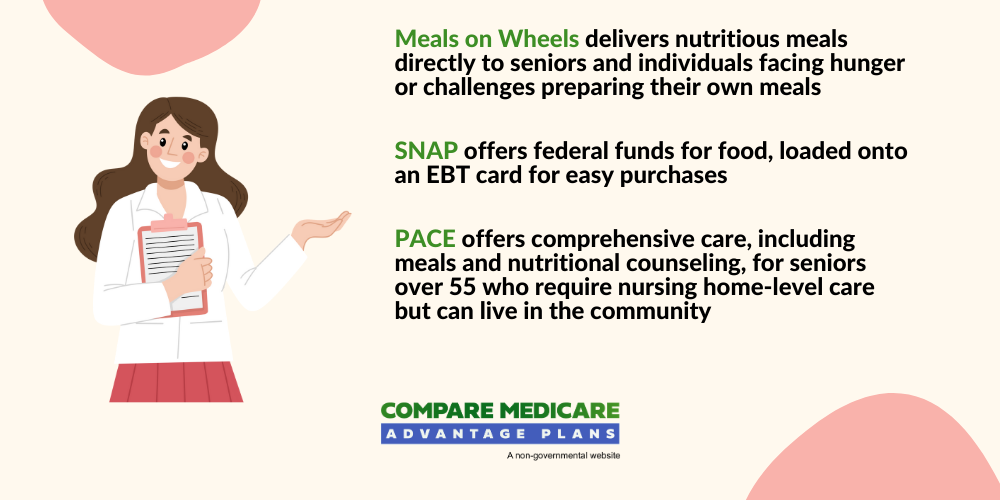$900 Medicare Food Benefit
It seems that Medicare Advantage plans are offering many new and attractive benefits as each year passes, and you may have heard of the $900 Medicare Food Benefit.
Many have questions about this term, and we are here to help clarify misconceptions and guide you through the ins and outs of this misunderstood concept.
Key Takeaways
- The $900 Medicare Food Benefit is a varying food allowance available under select Medicare Advantage plans, not a standard feature for all Medicare recipients.
- Qualification for the Medicare Food Allowance depends on individual income, having certain chronic health conditions, and enrollment in eligible Medicare Advantage Plans like Special Needs Plans.
- Beneficiaries can use the Medicare Healthy Food Card at participating grocery stores to buy eligible nutritious food items but must be aware of restrictions and limitations to avoid purchasing non-covered items.
Compare Plans in One Step!
Enter Zip Code
Understanding the $900 Medicare Food Benefit
Many people misconstrue the term $900 Medicare Food Benefit. It’s not a standard benefit for all Medicare recipients but is instead a food allowance provided by select Medicare Advantage plans, sometimes referred to as the Medicare grocery benefit.
The truth behind the $900 claim
People frequently inflate or misinterpret the $900 claim; the actual food allowance varies based on the specific Medicare Advantage plan and eligibility criteria. The typical amount for the Medicare Food Allowance ranges from around $25 to $50 per month.

Eligible Medicare Advantage plans
Certain Medicare Advantage plans, such as Special Needs Plans (SNPs) and certain Chronic Illness SNP plans, provide food allowance benefits to qualified members, helping them access nutritious food options.
How to Qualify for the Medicare Food Allowance
You need to meet specific criteria to qualify for the Medicare Food Allowance. These include income requirements, having a qualifying chronic health condition, and enrolling in a qualifying Medicare Advantage Plan.
Income requirements
The Medicare Food Allowance targets low-income seniors, especially those eligible for both Medicare and Medicaid, who may find it challenging to afford nutritious foods. By providing the Medicare Food Allowance Benefit, these individuals can receive additional support to maintain a healthy diet.
Chronic health conditions
Having certain chronic health conditions may qualify for food allowance benefits. This includes conditions such as diabetes, heart conditions, autoimmune disorders, arthritis, and COPD.
Understanding the food allowance benefit can help individuals better manage their health and dietary needs.
Enrollment in a qualifying plan
To access the Medicare Food Allowance, enrollment in a qualifying Medicare Advantage plan, such as a Special Needs Plan, is necessary.
Using Your Medicare Food Allowance Card

Once you’re eligible for the Medicare Food Allowance, you’ll receive a Medicare Healthy Food Card, also known as the Medicare Grocery Card, to use at certain grocery stores for buying qualified food products.
Keep in mind, though, that its use comes with some constraints and limitations on your grocery allowance.
Participating grocery stores
You can use your Medicare Food Allowance Card at a variety of participating grocery stores. The specific stores may vary based on your location and the specific Medicare Advantage plan you are enrolled in.
Eligible food items
The card allows for the purchase of a variety of nutritional foods and pantry staples, providing a health food benefit, such as healthy food options like:
- fresh fruits and vegetables
- dairy products
- proteins
- bread
- cereals
However, non-nutritional foods are generally not covered.
Restrictions and limitations
There are restrictions that prohibit the purchase of the following items with your Medicare Food Allowance Card:
- Non-food items
- Unhealthy food options
- Vitamins and supplements
- Baby foods
- Alcohol
- Desserts
- Soda
- Similar non-nutritional items
Tips for Maximizing Your Medicare Food Benefits
Having grasped what the Medicare Food Allowance is and its application, you should now learn how to make the most of its advantages. This involves shopping for nutritious foods and employing budgeting and saving tips.

Shopping for nutritious foods
When shopping with your Medicare Food Allowance Card, focus on purchasing nutrient-dense foods. These include fruits, vegetables, whole grains, lean proteins, and low-fat dairy products.
Budgeting and saving tips
You can stretch your food allowance further by shopping sales, using coupons, and buying in-season produce. These strategies will help you save money while still getting the nutritious food items you need.
Avoiding Scams and Fraudulent Offers
Although the Medicare Food Allowance is a genuine benefit for qualifying Medicare Advantage plan members, you should stay alert for scams and deceptive offers.
Recognize common scams and protect your personal information by ensuring the medicare food allowance legitimate sources are used.
Recognizing common scams
Common scams to watch out for include unsolicited phone calls or emails promising a $900 grocery benefit. Always verify any offers with your plan provider.
Protecting your personal information
Never share sensitive personal or financial information over the phone or email, and only provide information to trusted sources. Protecting your personal information is key to avoiding scams and fraudulent offers.
Alternative Food Assistance Programs for Seniors
If you’re ineligible for the Medicare Food Allowance or need extra help, other food assistance programs for seniors are available.
These include Meals on Wheels, the Supplemental Nutrition Assistance Program (SNAP), and the Program of All-Inclusive Care for the Elderly (PACE).
Meals on Wheels
Meals on Wheels delivers nutritious meals directly to seniors and individuals facing hunger or challenges preparing their own meals. It’s a beneficial program for seniors who may not be able to cook or grocery shop for themselves.
Supplemental Nutrition Assistance Program (SNAP)
SNAP is another federal program that provides funds for eligible food items. Benefits are loaded onto an Electronic Benefits Transfer (EBT) card, making it easy to purchase the items you need.
Program of All-Inclusive Care for the Elderly (PACE)
PACE offers comprehensive care, including meals and nutritional counseling, for seniors over 55 who require nursing home-level care but can live in the community.

Summary
In summary, the Medicare Food Allowance is a valuable benefit that can help seniors purchase nutritious foods. It’s offered by certain Medicare Advantage plans and is not a standard Medicare benefit.
The allowance can be used at participating grocery stores for eligible food items. To qualify, individuals must meet income requirements, have chronic health conditions, and enroll in a qualifying plan.
Remember to protect your personal information and be aware of scams and fraudulent offers. There are also other food assistance programs available for seniors, such as Meals on Wheels, SNAP, and PACE.
Frequently Asked Questions
→ Does Medicare give a food allowance?
No, original Medicare does not offer a food allowance or grocery benefit, but certain Medicare Advantage plans, such as Special Needs Plans (SNPs), may provide this benefit.
→ How can I protect myself from scams and fraudulent offers associated with the Medicare Food Allowance?
To protect yourself from Medicare Food Allowance scams, be cautious of unsolicited offers and verify any communication with your plan provider. Avoid sharing personal or financial information and only trust reputable sources.
Call us today for help in seeing which benefits you might qualify for.

ZRN Health & Financial Services, LLC, a Texas limited liability company
Russell Noga is the CEO of ZRN Health & Financial Services, and head content editor of several Medicare insurance online publications. He has over 15 years of experience as a licensed Medicare insurance broker helping Medicare beneficiaries learn about Medicare, Medicare Advantage Plans, Medigap insurance, and Medicare Part D prescription drug plans.



